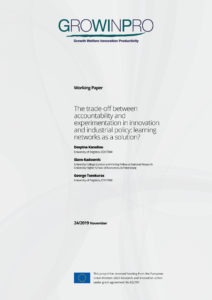The exact nature of the innovation policy challenges and the best way to address them are not known ex-ante. This requires a degree of experimentation, which is challenging to fit in the context of an accountable public administration. So, how to reconcile the experimental nature of innovation policy with the need for public accountability is crucial but still an unresolved challenge of new innovation and industrial policies.
We identify several distinct approaches to the issue of experimentation in innovation policy, each with its strengths and weaknesses. These are Smart Specialization Entrepreneurial Discovery Process by Foray, Experimental governance by Sabel and Zeitlin; Problem-driven iterative adaptation by Andrews et al.; Experimentation- feedback – adaptation by Crespi et al., and Directed improvisation (variation- selection – niche creation) by Ang. Also, all these approaches face the challenge of how to reconcile experimentation with the requirements for accountability.
The weakness of experimental approaches is that like in conventional public policy the existing power structure can be transposed into the policy process. When that happens, the whole process may turn into pro forma exercise rather than being transformative practice in the governance of innovation systems. In the conditions of low institutional implementation capacity, this problem gets further magnified lading to pervasive ‘isomorphic mimicry’. We propose a principle of ‘action learning’ and governance mechanism of ‘learning networks’ (LN) which may overcome challenges of implementation of experimental governance in the conditions of the conventional public policy. This proposal is based on the insight that experimental innovation policy will have the most significant effect when connected to action (experimental) learning as the best way to ensure immediate feedback on what works and why.

 The trade-off between accountability and experimentation in innovation and industrial policy: learning networks as a solution?
The trade-off between accountability and experimentation in innovation and industrial policy: learning networks as a solution?